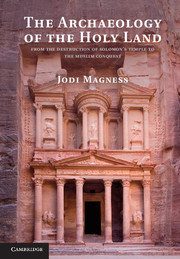Book contents
- Frontmatter
- Contents
- List of Illustrations
- Preface
- 1 Introduction
- 2 The Topography and Early History of Jerusalem (to 586 B.C.E.)
- 3 The Babylonian (586–539 B.C.E.) and Persian (539–332 B.C.E.) Periods
- 4 The Early Hellenistic Period (332–167 B.C.E.)
- 5 The Late Hellenistic (Hasmonean) Period (167–40 B.C.E.)
- 6 The Archaeology of Qumran and the Dead Sea Scrolls
- 7 The Early Roman (Herodian) Period (40 B.C.E.–70 C.E.)
- 8 The Early Roman (Herodian) Period (40 B.C.E.–70 C.E.)
- 9 The Early Roman (Herodian) Period (40 B.C.E.–70 C.E.)
- 10 The Early Roman (Herodian) Period (40 B.C.E.–70 C.E.)
- 11 Ancient Jewish Tombs and Burial Customs (to 70 C.E.)
- 12 From 70 C.E. to the Bar-Kokhba Revolt (132–135/136 C.E.)
- 13 Aelia Capitolina (Hadrianic Jerusalem) (135 to ca. 300 C.E.)
- 14 Roman and Late Antique Period Synagogues in Palestine
- 15 The Byzantine (Early Christian) Period (313–640 C.E.)
- 16 The Byzantine (Early Christian) Period (313–640 C.E.)
- 17 Epilogue
- Glossary
- Timeline
- Index
- References
4 - The Early Hellenistic Period (332–167 B.C.E.)
Published online by Cambridge University Press: 05 November 2012
- Frontmatter
- Contents
- List of Illustrations
- Preface
- 1 Introduction
- 2 The Topography and Early History of Jerusalem (to 586 B.C.E.)
- 3 The Babylonian (586–539 B.C.E.) and Persian (539–332 B.C.E.) Periods
- 4 The Early Hellenistic Period (332–167 B.C.E.)
- 5 The Late Hellenistic (Hasmonean) Period (167–40 B.C.E.)
- 6 The Archaeology of Qumran and the Dead Sea Scrolls
- 7 The Early Roman (Herodian) Period (40 B.C.E.–70 C.E.)
- 8 The Early Roman (Herodian) Period (40 B.C.E.–70 C.E.)
- 9 The Early Roman (Herodian) Period (40 B.C.E.–70 C.E.)
- 10 The Early Roman (Herodian) Period (40 B.C.E.–70 C.E.)
- 11 Ancient Jewish Tombs and Burial Customs (to 70 C.E.)
- 12 From 70 C.E. to the Bar-Kokhba Revolt (132–135/136 C.E.)
- 13 Aelia Capitolina (Hadrianic Jerusalem) (135 to ca. 300 C.E.)
- 14 Roman and Late Antique Period Synagogues in Palestine
- 15 The Byzantine (Early Christian) Period (313–640 C.E.)
- 16 The Byzantine (Early Christian) Period (313–640 C.E.)
- 17 Epilogue
- Glossary
- Timeline
- Index
- References
Summary
Historical Background: General
After the end of the Peloponnesian War in 404 B.C.E., Greece was fragmented politically, with no major powers or power blocs. This situation changed in the middle of the fourth century with the rise of Macedon. Macedon was a tribal kingdom on the northeast periphery of the Greek world ruled by Philip II, a warrior-king. The Greeks considered the Macedonians semi-barbarians – that is, not fully Greek. The word barbarian derives from “bar-bar-bar,” which was how the Greeks described the sound of other languages. In 338 B.C.E., Philip II defeated a coalition of Greek city-states at the battle of Chaeronea and united Greece under Macedonian rule. Philip II's preparations to invade the Persian Empire were cut short, however, when he was assassinated in 336 B.C.E.
Philip II was succeeded to the Macedonian throne by his 18-year-old son, Alexander. Two years later (334 B.C.E.), Alexander launched an invasion of the Persian Empire, crossing the Hellespont and landing on Persian soil in the area of Troy. From there, Alexander marched eastward with his troops. The Persian king Darius III led his army against the invaders; over the next four years, he fought a series of battles against Alexander. Alexander was victorious in all the battles, until finally, after the last battle (at Gaugamela in 331 B.C.E.), Darius was murdered by his own men, paving the way for Alexander to become ruler of the Persian Empire. Alexander continued to march eastward with his army, conquering lands that had not been subject to the Persians, through Bactria and Sogdiana (modern Afganistan, Uzbekistan, and Tajikistan), into southern Russia, and across the Indus River Valley into India. Alexander apparently planned to invade Arabia, but his Macedonian troops refused to go any farther, putting an end to future expansion and setting the limits of his empire.
- Type
- Chapter
- Information
- The Archaeology of the Holy LandFrom the Destruction of Solomon's Temple to the Muslim Conquest, pp. 63 - 91Publisher: Cambridge University PressPrint publication year: 2012



